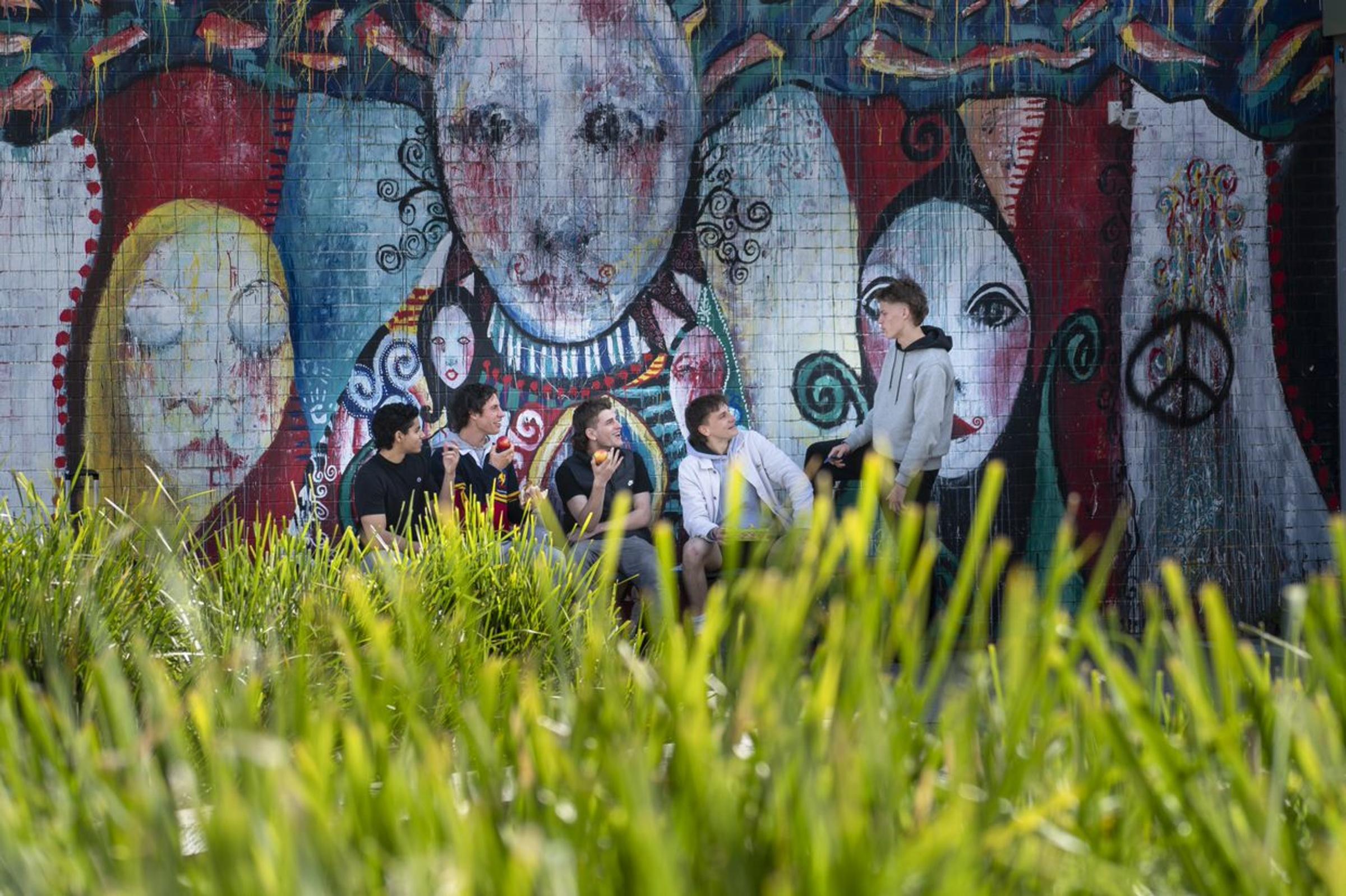Student Welbeing

Wellbeing of Adolescent Males: Insights and Support
As we navigate the ever-changing dynamic of adolescence, it's important to recognise and respond to the unique wellbeing needs of our young male identifying students. While every individual is distinct, research sheds light on some trends and differences that can guide us in providing the best support for young male students.
Encouraging Expression:
Research suggests that adolescent boys may face societal expectations discouraging emotional vulnerability. Encourage open communication and provide a safe space for your sons to express their feelings.
Peer Pressure in Social Relationships:
Boys often encounter different peer pressures compared to girls. Foster a supportive environment where your son feels comfortable discussing social challenges, helping him navigate friendships and societal expectations.
Addressing Educational Challenges:
Boys might face unique academic challenges. Stay involved in your son's educational journey, communicate with teachers, and provide the necessary support to ensure a positive and encouraging learning environment.
Physical Wellbeing - Body Image and Fitness:
Society's expectations regarding body image can impact young boys. Promote a healthy attitude towards physical wellbeing, emphasizing the importance of overall health rather than conforming to societal norms.
Risk-Taking Behaviours:
Adolescence often brings about a tendency for risk-taking. Stay informed about your son's activities, engage in open conversations about decision-making, and provide guidance to help him make informed choices.
By understanding these aspects, it strengthens one’s ability as a parent to provide the support and guidance required during this critical stage of development. At Eltham High, we tailor our approach to their unique needs, and we aspire to contribute to fostering a positive and resilient mindset for their future.
For those interested in delving deeper into this topic, we encourage you to explore the referenced articles below as they were used to create this newsletter piece. The insights gained from these studies can further inform your understanding and approach in understanding the wellbeing of your young person.
References:
Gardner, M., & Steinberg, L. (2005). Peer influence on risk taking, risk preference, and risky decision making in adolescence and adulthood: An experimental study. Developmental Psychology, 41(4), 625–635. https://doi.org/10.1037/0012-1649.41.4.625
Karazsia, B. T., Murnen, S. K., & Tylka, T. L. (2017). Is body dissatisfaction changing across time? A cross-temporal meta-analysis. Psychological bulletin, 143(3), 293–320. https://doi.org/10.1037/bul0000081
Prinstein, M. J., Brechwald, W. A., & Cohen, G. L. (2011). Susceptibility to peer influence: Using a performance-based measure to identify adolescent males at heightened risk for deviant peer socialisation. Developmental Psychology, 47(4), 1167–1172. https://doi.org/10.1037/a0023271
Raffaelli, M., & Crockett, L. (2003). Sexual risk taking in adolescence: The role of self-regulation and attraction to risk. Developmental Psychology, 39(6), 1036–1046. https://doi.org/10.1037/0012-1649.39.6.1036
Ruzek, E. A., Hafen, C. A., Allen, J. P., Gregory, A., Mikami, A. Y., & Pianta, R. C. (2016). How teacher emotional support motivates students: The mediating roles of perceived peer relatedness, autonomy support, and competence. Learning and Instruction, 42, 95–103. https://doi.org/10.1016/j.learninstruc.2016.01.005
Nurturing Teen Wellbeing Amidst the Middle East Crisis
As a community, it's essential for us to come together and support one another, especially when it comes to the wellbeing of our students and your young people who may be grappling with the impact of conflict.
Our Student Services team have created some suggestions to help nurture their wellbeing at home:
Understanding Their Perspective
Adolescence is already a time of immense change and self-discovery. When compounded with the stress of a constant narrative about war and conflict, young people may experience heightened feelings, anxiety, and uncertainty. It's crucial to recognise their unique perspective and thought processes during this time.
Open Communication
Create a safe space for open communication. Encourage your young person to express their thoughts and feelings, and actively listen without judgment. Understand that their reactions may vary, from anger to fear, and reassure them that their feelings are valid.
Establishing Routine and Normalcy
In times of crisis, maintaining a sense of routine can provide stability and comfort. Establishing a daily schedule can help a student regain a sense of normalcy amidst the chaos. This routine can include schoolwork, leisure activities, and family time.
Limiting Exposure to Media
Constant exposure to news and social media can be overwhelming. Encourage your young person to take breaks from the news and engage in activities that bring joy and relaxation.
Connecting with Peers
Social connections are vital for young people. Facilitate opportunities for them to connect with friends, even if it's through virtual means. Friends can provide a sense of harmony and understanding, making adversity more manageable.
Seeking Professional Support
If you notice persistent signs of concern in your young person, such as changes in behaviour, sleep disturbances, or withdrawal, consider reaching out to Student Services or obtaining an external referral through your General Practitioner. We can provide you with relevant support based on your young person’s presenting needs.
Encouraging Acts of Kindness
Encourage acts of kindness, whether it's helping their friends, volunteering at their local sporting club, or the simplicity of expressing empathy. These actions can foster a sense of purpose and resilience.
As always, we strongly encourage parents to get in touch with their student's Coordinator and the Student Services team if additional wellbeing support is needed.
Second Hand Text Books
Thank you to the families that donate their students' textbooks. To the donating parents it is recommended that you bring the textbooks to Student Services where parents and or students can attend and select their 2024 required books.
Women in Sports Breakfast
Nillumbik Youth have booked a table at Nillumbik’s second annual Women in Sport breakfast and we would love to invite interested young people to join us! This year’s event will feature a guest panel and address from keynote speaker Melissa Barbieri.
Melissa is an experienced public speaker who will talk about her personal story of resilience, sacrifice, and overcoming challenges. Melissa is a passionate advocate of women’s health, women in sport, and diversity.
Location: Eltham Community and Reception Centre.
Date and time: Friday 1 December, 7:00am - 8:30am.
Please provide interested student’s RSVP to Meg Exell, Team Leader Youth Development Community Partnerships Meg.Exell@nillumbik.vic.gov.au 03 9433 3156 | 0428 577 464, limited spaces available.
MADELINE KAMAMIS, Student Services Leader
